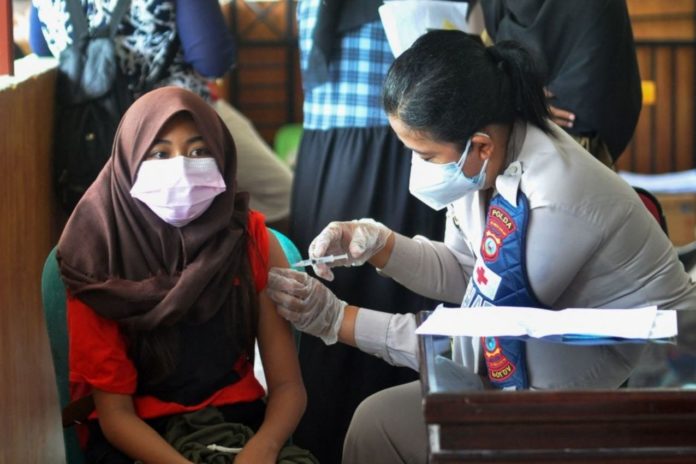Especially after the second dose: four tips to avoid strong vaccine reactions
Many people suffer from vaccination reactions, especially after the second vaccination dose with an mRNA vaccine.
Revyuh explains what to expect, what increases and decreases the likelihood of it – and when you should consult a doctor.
- Scientists in Fear of This New Predator From Red Sea Eating Native Species in Mediterranean
- Does This Mean We Stopped Being Animal and Started Being Human Due to ‘Copy Paste’ Errors?
- The One Lifestyle Choice That Could Reduce Your Heart Disease Risk By More Than 22%
- Aging: This Is What Happens Inside Your Body Right After Exercise
- Immune-Boosting Drink that Mimics Fasting to Reduce Fat – Scientists ‘Were Surprised’ By New Findings
Even the first dose of a corona vaccination makes some people feel unwell. However, it is above all the second that triggers strong vaccination reactions in most. That applies at least to the mRNA vaccines from Pfizer and Moderna.
The preparations are now also administered in the case of cross-vaccinations, i.e. after an initial Astrazeneca dose.
Four tips: How to prevent strong vaccine reactions
You cannot completely prevent vaccination reactions. These are very individual and can vary from person to person. But you can help prevent the symptoms from getting worse and worse.
Take care of yourself
You should rest after vaccination. According to experts, there is nothing against a slight physical strain after a vaccination.
However, you should not overdo it: Extreme endurance sports or training with high weight loads should be avoided immediately after vaccination.
Because strong physical exercise may trigger the pain at the injection site.
Avoid alcohol
Basically, health officials do not give their own behavioral recommendations for alcohol consumption before or after the vaccination.
However, it has long been known that alcohol affects the immune system. Particularly heavy consumption of alcohol could limit the immune response in the event of infections and, in the case of vaccinations, possibly also influence the tolerance and effectiveness of the vaccination.
So you should better avoid it immediately after the vaccination.
Take medication (in consultation with the doctor)
After consulting your family doctor, according to health officials, you can take pain-relieving or fever lowering medication in the event of strong vaccination reactions.
Means such as paracetamol, diclofenac or ibuprofen are often used here.
However, you should not take any preparations as a precaution before vaccination reactions can occur.
This could affect the effectiveness of the vaccination.
Use home remedies
In the event of fever, pain and swelling, you can also use well-known home remedies. Ice cubes, for example, is used for the painful, thick puncture site.
If you have a fever, you should drink a lot, ideally mineral water at room temperature and herbal tea.
Linden blossom and ginger tea, for example, help you sweat. Also, don’t force yourself to eat. Prefer light meals, such as soup, fruit, yogurt and quark.
Heavy food would put a strain on digestion and thus use up too much energy, which the body now needs for defense.
- Scientists in Fear of This New Predator From Red Sea Eating Native Species in Mediterranean
- Does This Mean We Stopped Being Animal and Started Being Human Due to ‘Copy Paste’ Errors?
- The One Lifestyle Choice That Could Reduce Your Heart Disease Risk By More Than 22%
- Aging: This Is What Happens Inside Your Body Right After Exercise
- Immune-Boosting Drink that Mimics Fasting to Reduce Fat – Scientists ‘Were Surprised’ By New Findings
Difference: vaccination reactions, vaccination complications and vaccination damage
What we commonly refer to as “side effects” are in most cases vaccination reactions or vaccination complications.
- Vaccination reactions are usually the expression of the desired confrontation of the immune system with the vaccine and usually subside after a few days. These can be, for example, severe headaches, pain in the limbs and joints, pain or swelling at the injection site, redness, tiredness or flu-like symptoms.
- Vaccination complications, on the other hand, are serious adverse drug reactions (ADRs). They are very rare after vaccinations. These are symptoms that go beyond the usual level of a vaccination reaction – as described above.
- Vaccination damages are vaccination complications, which in very rare cases are so serious that they represent long-term health or economic consequence. You can have this consequence recognized as vaccination damage upon application.
When to see a doctor
In most cases, the symptoms mentioned are vaccine reactions. They are uncomfortable but harmless.
However, if the symptoms get worse and do not subside even after several days, you should consult your doctor.
For example, if the fever rises sharply, nausea persists or headaches are massive. Skin changes such as rashes should also be clarified; in rare cases, they also occur in areas other than the vaccination arm.
- Scientists in Fear of This New Predator From Red Sea Eating Native Species in Mediterranean
- Does This Mean We Stopped Being Animal and Started Being Human Due to ‘Copy Paste’ Errors?
- The One Lifestyle Choice That Could Reduce Your Heart Disease Risk By More Than 22%
- Aging: This Is What Happens Inside Your Body Right After Exercise
- Immune-Boosting Drink that Mimics Fasting to Reduce Fat – Scientists ‘Were Surprised’ By New Findings
The following rules of thumb apply:
- If the reactions last longer than three days after the vaccination or if they occur four to 16 days after the vaccination, you should inform the doctor – this means calling the doctor’s office to be on the safe side even if you suspect a Covid arm.
- The very rare complication of thrombosis in the brain, as it is known after Astrazeneca vaccinations, can be indicated by certain signs that persist or recur more than three days after the vaccination, as reported by the Society for Thrombosis and Haemostasis Research. These include dizziness, headaches, visual disturbances, nausea/vomiting, shortness of breath, acute pain in the chest, abdomen or arms/legs.
